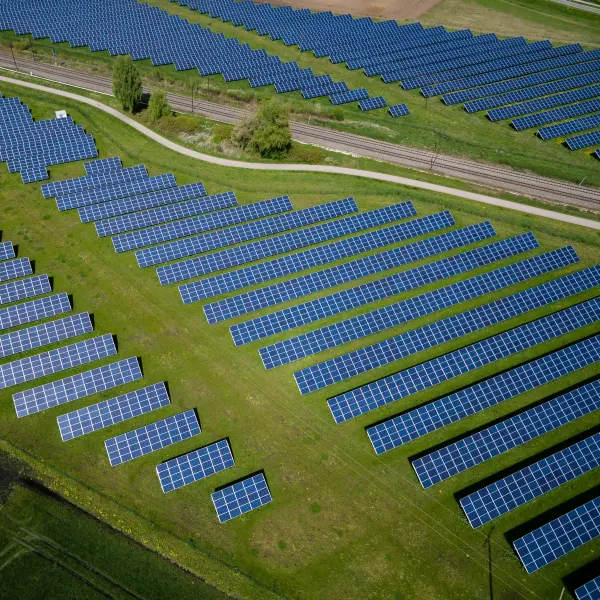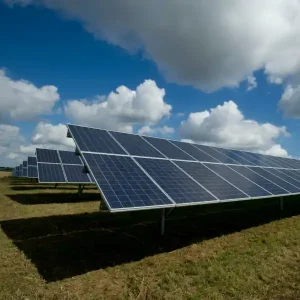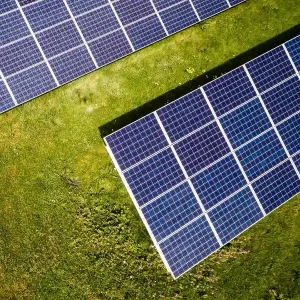Solar energy is rapidly gaining momentum as a viable and sustainable alternative to traditional sources of power. With its numerous environmental, economic, and social benefits, solar energy is revolutionizing the way we generate and consume electricity. In this comprehensive guide, we will delve into the various advantages of solar energy, debunk common myths surrounding its adoption, explore future trends and innovations, and provide valuable insights into its role in achieving sustainable development goals.
Introduction to Solar Energy
What is Solar Energy?
Solar energy is radiant light and heat from the sun that is harnessed using a range of technologies, including photovoltaic cells, solar panels, and solar thermal collectors. This abundant and renewable energy source offers a clean and sustainable solution to meet the world’s growing energy demands.
How Does Solar Energy Work?
Solar panels, composed of photovoltaic cells, convert sunlight into electricity through the photovoltaic effect. When sunlight strikes the surface of the solar panels, it excites electrons within the cells, generating an electric current. This electricity can then be used to power homes, businesses, and even entire communities.
Environmental Benefits of Solar Energy
Reduction of Greenhouse Gas Emissions
One of the most significant environmental benefits of solar energy is its ability to reduce greenhouse gas emissions. Unlike fossil fuels, which release harmful pollutants such as carbon dioxide and methane into the atmosphere, solar energy production generates no greenhouse gases, helping to mitigate climate change and reduce air pollution.
Conservation of Natural Resources
Solar energy relies on the infinite supply of sunlight, making it a sustainable alternative to finite fossil fuels. By harnessing the power of the sun, we can reduce our dependence on non-renewable resources such as coal, oil, and natural gas, preserving precious natural habitats and ecosystems.
Economic Benefits of Solar Energy
Cost Savings on Electricity Bills
One of the most compelling reasons to invest in solar energy is the potential for significant cost savings on electricity bills. By generating your own clean energy from the sun, you can reduce or even eliminate your reliance on expensive grid electricity, providing long-term financial benefits for homeowners and businesses alike.
Job Creation and Economic Growth
The solar energy industry has become a major driver of job creation and economic growth, providing employment opportunities in manufacturing, installation, maintenance, and research and development. As the demand for solar energy continues to rise, so too does the need for skilled workers, contributing to a thriving green economy.
Energy Independence with Solar Power
Decreased Reliance on Fossil Fuels
By harnessing the power of the sun, we can reduce our dependence on fossil fuels, which are finite resources with harmful environmental impacts. Solar energy offers a decentralized and renewable alternative to traditional sources of power, promoting energy independence and security.
Resilience Against Energy Price Fluctuations
Solar energy can help protect against fluctuations in energy prices by providing a stable and predictable source of electricity. Unlike fossil fuels, which are subject to price volatility and geopolitical tensions, sunlight is abundant and freely available, making solar power a reliable investment for the future.
Solar Energy and Public Health
Reduction of Air Pollution
The transition to solar energy can lead to significant improvements in public health by reducing air pollution and respiratory illnesses associated with traditional forms of energy production. By replacing coal-fired power plants and other polluting sources of electricity with clean, renewable solar energy, we can create healthier and more sustainable communities.
Improved Quality of Life
Access to solar energy can have a transformative impact on the quality of life for individuals and communities around the world. From powering medical clinics and schools in remote areas to providing clean water and sanitation, solar energy can help meet basic human needs and improve standards of living.
Solar Energy for Remote Areas and Disaster Relief
Accessibility in Remote Regions
Solar energy offers a practical solution for providing electricity to remote and off-grid communities that lack access to centralized power grids. By installing solar panels and energy storage systems, these communities can become self-sufficient and resilient in the face of energy scarcity and natural disasters.
Emergency Preparedness and Disaster Response
In times of crisis, such as natural disasters or grid failures, solar energy can provide a reliable source of power for emergency response efforts and disaster relief operations. Portable solar generators and microgrids can be deployed quickly to provide essential services such as lighting, communication, and medical care in affected areas.
Solar Energy Incentives and Rebates
Government Incentive Programs
Many governments around the world offer incentives and rebates to encourage the adoption of solar energy, making it more affordable for homeowners, businesses, and communities. These incentives may include tax credits, grants, and rebates for the installation of solar panels and other renewable energy systems. By taking advantage of these government incentive programs, individuals and organizations can offset the upfront costs of solar installation and accelerate the transition to clean, sustainable energy.
Tax Credits and Rebates
In addition to government incentives, there are various tax credits and rebates available to support solar energy adoption. These financial incentives can help offset the initial investment in solar equipment and reduce the payback period, making solar energy more accessible and attractive to consumers.
Myths and Misconceptions About Solar Energy
Solar Panels are Unaffordable
One common misconception about solar energy is that it is prohibitively expensive to install. While the upfront cost of solar panels and equipment may seem daunting, it is important to consider the long-term savings and return on investment. With declining costs and available financing options, solar energy has become increasingly affordable for homeowners and businesses.
Solar Energy is Unreliable
Another myth surrounding solar energy is that it is unreliable, especially in cloudy or cold climates. While it is true that solar panels are most effective in regions with abundant sunlight, advancements in solar technology have made it possible to generate electricity even on overcast days. Additionally, energy storage solutions such as batteries can store excess energy for use during periods of low sunlight.
Solar Panels Require Constant Maintenance
Contrary to popular belief, solar panels require minimal maintenance to operate efficiently. Routine inspections and cleaning may be necessary to ensure optimal performance, but modern solar panels are designed to withstand harsh weather conditions and require little to no upkeep over their lifespan.
Solar Energy is Inefficient in Cloudy or Cold Climates
While solar energy production may be slightly reduced in cloudy or cold climates, solar panels can still generate significant amounts of electricity under these conditions. With proper system design and orientation, solar installations in colder regions can be optimized to capture as much sunlight as possible, maximizing energy output throughout the year.
Future Trends and Innovations in Solar Energy
Advancements in Solar Technology
The field of solar technology is constantly evolving, with ongoing research and development leading to breakthroughs in efficiency, durability, and affordability. Emerging technologies such as thin-film solar cells, perovskite solar cells, and solar paint hold the potential to further revolutionize the solar industry and drive down costs.
Integration of Solar Power with Energy Storage Systems
Energy storage systems, such as batteries and pumped hydroelectric storage, play a crucial role in maximizing the value of solar energy by storing excess electricity for use when the sun is not shining. As battery technology continues to improve and costs decline, the integration of solar power with energy storage systems is expected to become increasingly widespread.
Solar Energy in Space
Innovations in space-based solar power have the potential to revolutionize the way we generate and transmit electricity. By capturing solar energy in space and transmitting it to Earth via microwave or laser beams, space-based solar power could provide a continuous and abundant source of clean energy, free from the limitations of weather and geography.
Challenges and Barriers to Solar Adoption
Initial Cost Barriers
Despite the numerous benefits of solar energy, upfront costs remain a significant barrier to adoption for many consumers. While the long-term savings and environmental benefits of solar power are undeniable, the initial investment required for solar installation can be prohibitive for some homeowners and businesses.
Regulatory Challenges
Regulatory barriers, such as zoning restrictions and permitting requirements, can also hinder the widespread adoption of solar energy. Streamlining the permitting process and implementing supportive policies at the local, state, and federal levels can help remove these barriers and facilitate the deployment of solar installations.
Technological Limitations
While solar technology has made significant advancements in recent years, there are still some technological limitations that need to be addressed. Challenges such as intermittency, energy storage, and grid integration require innovative solutions to ensure the reliable and efficient deployment of solar energy on a large scale.
Solar Energy and Sustainable Development Goals
Contribution to Sustainable Development
Solar energy plays a crucial role in achieving sustainable development goals by providing access to clean, affordable, and reliable electricity. By expanding access to solar energy in developing countries, we can improve living standards, enhance economic opportunities, and promote environmental sustainability.
Alleviation of Energy Poverty
Access to electricity is essential for human development, yet millions of people around the world still lack reliable access to power. Solar energy offers a decentralized and cost-effective solution for addressing energy poverty, empowering communities to meet their energy needs and improve their quality of life.
Case Studies: Successful Solar Energy Projects
Utility-Scale Solar Installations
Utility-scale solar installations, such as solar farms and solar parks, have become increasingly common around the world. These large-scale projects can generate significant amounts of electricity and help utilities meet renewable energy targets, while also creating jobs and stimulating economic growth in local communities.
Community Solar Initiatives
Community solar initiatives enable individuals and organizations to collectively invest in and benefit from solar energy projects. By pooling resources and sharing the benefits of solar installations, community solar programs make clean energy more accessible and inclusive, while also fostering community engagement and collaboration.
Educational Resources and Training in Solar Energy
Workshops and Courses
There is a growing demand for education and training in the field of solar energy, as individuals seek to gain the skills and knowledge needed to enter the rapidly expanding solar industry. Workshops, courses, and online resources offer opportunities for professionals and enthusiasts alike to learn about solar technology, design, installation, and maintenance.
Certification Programs
Certification programs provide formal recognition of competency and expertise in solar energy, helping individuals demonstrate their qualifications to employers and clients. From solar panel installation and system design to project management and energy auditing, certification programs offer a pathway to career advancement and professional development in the solar industry.
Conclusion
In conclusion, the benefits of solar energy are undeniable, offering a clean, sustainable, and affordable solution to our energy needs. From environmental protection and economic growth to public health and social equity, solar energy has the power to transform our world for the better. By embracing solar technology and overcoming the challenges to its adoption, we can build a brighter and more sustainable future for generations to come.
FAQs (Frequently Asked Questions)
Are solar panels expensive to install?
While the upfront cost of solar panels can vary depending on factors such as system size and location, there are many financing options and incentive programs available to make solar installation more affordable for homeowners and businesses.
Do solar panels work in cloudy weather?
While solar panels are most effective in sunny conditions, they can still generate electricity on cloudy days. However, energy production may be reduced during periods of low sunlight, so it is important to consider factors such as climate and weather when planning a solar installation.
How long do solar panels last?
Most solar panels are designed to last for 25 years or more, with many manufacturers offering warranties to guarantee performance and durability. With proper maintenance and care, solar panels can continue to generate electricity long into the future.
Are there government incentives for installing solar panels?
Yes, many governments offer incentives and rebates to encourage the adoption of solar energy, including tax credits, grants, and feed-in tariffs. These financial incentives can help offset the upfront costs of solar installation and make solar energy more accessible to consumers.
Can I still use electricity from the grid if I have solar panels?
Yes, most solar energy systems are connected to the electrical grid, allowing homeowners and businesses to draw electricity from the grid when their solar panels are not producing enough power. This ensures a reliable and consistent source of electricity, even during periods of low sunlight.




